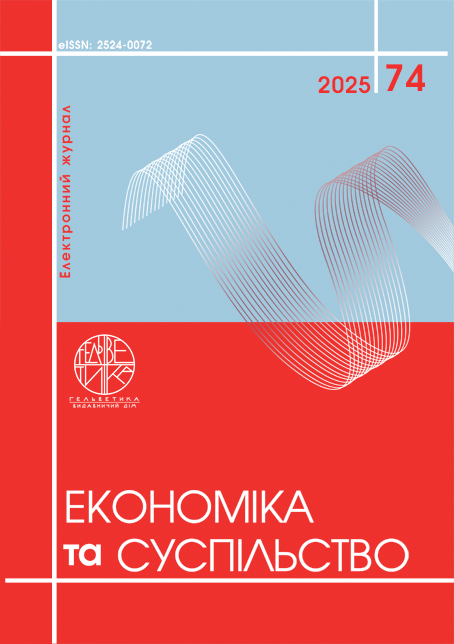RESEARCH ON THE TRANSFORMATION OF CONSUMER BEHAVIOR IN THE HOSPITALITY AND TOURISM SECTOR
Abstract
Global events, the COVID-19 pandemic, the full-scale war in Ukraine have significantly transformed the everyday lives of Ukrainians. These changes have, in turn, affected their consumer habits, both in general and specifically within the tourism and hospitality sectors. The relevance of this study lies in identifying the patterns and determinants of new consumer behaviour, which can help develop effective demand management tools and enhance the resilience of tourism and hospitality services in an unstable environment. The article explores how the lifestyle and consumer behaviour of Ukrainians evolved during the pandemic and wartime periods, and how these shifts influenced overall consumption levels as well as demand for tourism and hospitality services in particular. Digital technologies have become an integral part of everyday interaction with services, shaping new expectations regarding the quality of service and communication. During times of crisis, people tend to intuitively minimize risks and reduce non-essential spending, especially in categories related to leisure and travel. However, this response is not merely temporary, over time, such behavior often transforms into lasting consumer habits that persist even after the crisis has passed. On the other hand, tourism, hotel and catering businesses today serve not only entertainment or recreational purposes but also play an important socio-psychological role. They help individuals cope with emotional exhaustion, restore a sense of normalcy, and become a source of moral support, in some cases, a strong motivation іs the desire to create positive memories. As a result, consumers increasingly choose to travel within the country, even under difficult conditions, recognizing that such actions support the local economy and reflect trust in domestic products. In the hospitality sector, patriotic consumption is evident in the preference for authentic Ukrainian establishments, national cuisine, local products, and brands. Consumer behavior, fluctuating between spending and saving, highlights how sensitive the hospitality and tourism sector is to external changes.
References
Sigala M. Tourism and COVID-19: Impacts and implications for advancing and resetting industry and research. Journal of Business Research. 2020. Vol. 117. p. 312–321. URL: https://doi.org/10.1016/j.jbusres.2020.06.015 (дата звернення: 24.05.25)
Радіонова О.М., Писарева І.В., Александрова С.А. Аналіз тенденцій сучасного туристичного попиту: вплив культурних змін та технологічних інновацій на вибір подорожей. Економіка та суспільство. 2024. № 60. URL: https://economyandsociety.in.ua/index.php/journal/article/view/3700 (дата звернення: 24.05.25)
Бочко О. Ю., Кожушок Н. Дослідження поведінки споживачів в умовах СОVID-19 та вплив на них трендів маркетингу. Приазовський економічний вісник. 2021. № 2 (25). С. 66–71. URL: http://pev.kpu.zp.ua/journals/2021/2_25_ukr/14.pdf. (дата звернення: 24.05.25)
Смирнов І., Любіцева О. Відкладений попит на туристичні послуги як чинник розвитку туризму в постпандемічний час у світі та в Україні. Вісник Київського національного університету культури і мистецтв. Серія: Туризм. 2022. №5(1). С. 6–26. URL: https://doi.org/10.31866/2616-7603.5.1.2022.261993 (дата звернення: 24.05.25)
Tomej K., Bilynets I. Large-scale tourism transformations through regeneration: A living systems perspective on tourism developments in Ukraine during the war. Annals of Tourism Research. Vol. 109, 2024. URL: https://doi.org/10.1016/j.annals.2024.103856. (дата звернення: 24.05.25)
Lukianenko A. Examining Changes in Brand Preferences During Crisis: The Case of Ukraine. Acta academica karviniensia, 2024. Volume XXIV(2). p. 28-41. DOI: 10.25142/aak.2024.00
Friedman, Walter A. "Irving Fisher, Economic Forecasting, and the Myth of the Business Cycle." Harvard Business School Working Paper,
No. 08-037, November 2007. URL: https://www.hbs.edu/faculty/Pages/item.aspx?num=31250 (дата звернення: 24.05.25)
Sigala M. (2020). Tourism and COVID-19: Impacts and implications for advancing and resetting industry and research. Journal of Business Research, Vol. 117, pp. 312–321. Available at: https://doi.org/10.1016/j.jbusres.2020.06.015 (accessed May 24, 2025)
Radionova O. M., Pysareva I. V., Aleksandrova S. A. (2024). Analiz tendentsii suchasnoho turytychnoho popytu: vplyv kulturnykh zmin ta tekhnolohichnykh innovatsii na vybir podorozhei [Analysis of Trends in Contemporary Tourism Demand: The Impact of Cultural Shifts and Technological Innovations on Travel Choices]. Ekonomika ta suspilstvo, № 60. Available at: https://economyandsociety.in.ua/index.php/journal/article/view/3700 (accessed May 24, 2025)
Bochko O. Yu., Kozhushok N. (2021). Doslidzhennia povedinky spozhyvachiv v umovakh COVID-19 ta vplyv na nykh trendiv marketynhu [Consumer Behavior Research Under COVID-19 Conditions and the Impact of Marketing Trends]. Pryazovskyi ekonomichnyi visnyk, № 2(25), pp. 66–71. Available at: http://pev.kpu.zp.ua/journals/2021/2_25_ukr/14.pdf (accessed May 24, 2025)
Smyrnov I., Liubitseva O. (2022). Vidkladenyi popyt na turystychni posluhy yak chynnyk rozvytku turyzmu v postpandemichnyi chas u sviti ta v Ukraini [Postponed Demand for Tourism Services as a Driver of Tourism Development in the Post-Pandemic Period in the World and in Ukraine]. Visnyk Kyivskoho natsionalnoho universytetu kultury i mystetstv. Seriia: Turyzm, 5(1), pp. 6–26. Available at: https://doi.org/10.31866/2616-7603.5.1.2022.261993 (accessed May 24, 2025)
Tomej K., Bilynets I. (2024). Large-scale tourism transformations through regeneration: A living systems perspective on tourism developments in Ukraine during the war. Annals of Tourism Research, Vol. 109. Available at: https://doi.org/10.1016/j.annals.2024.103856 (accessed May 24, 2025)
Lukianenko A. (2024). Examining Changes in Brand Preferences During Crisis: The Case of Ukraine. Acta Academica Karviniensia, Vol. XXIV(2), pp. 28–41. DOI: 10.25142/aak.2024.00
Friedman W. A. (2007). Irving Fisher, Economic Forecasting, and the Myth of the Business Cycle. Harvard Business School Working Paper, No. 08-037. Available at: https://www.hbs.edu/faculty/Pages/item.aspx?num=31250 (accessed May 24, 2025)

This work is licensed under a Creative Commons Attribution 4.0 International License.


